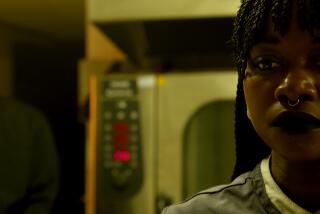MOVIE REVIEW : ‘CHAPDELAINE’---- BEAUTY OF A GRIM LIFE
- Share via
‘Maria Chapdelaine” (at the Los Feliz and Moni ca 4-Plex) illuminates with compassion the profound roles of nature and religion in shaping lives.
This achievement is not in itself unusual; what makes the film so extraordinary is its deeply spiritual acceptance of life in all its harshness. So rare is this quality in the films of Western culture, apart from those of Bresson and Dreyer, that it automatically brings to mind early D. W. Griffith and the Japanese cinema, Imamura’s recent version of “The Ballad of Narayama” in particular. For all its destructiveness, nature in “Maria Chapdelaine” is not the enemy but rather merely a grim everyday reality to be faced as bravely as possible, with the sustenance of religion.
However, in adapting Louis Hemon’s classic 1916 novel (which has been filmed twice before), veteran French-Canadian director Gilles Carle and co-adapter Guy Fournier wisely let us discover all this for ourselves as their film unfolds in all its austere beauty. Indeed, at its beginning, a narrator’s voice tells us that the French have been living in Canada’s wilderness for more than 300 years, and that perhaps they might be better off if they believed more in the magic of the Native Americans than in the demons of their Catholicism. And only in time do we come to realize how harmonious a strict religion is with a hard existence--how it gives life a meaning it would not otherwise have.
It’s a life that lovely, dark-haired Maria Chapdelaine (Carole Laure, who must convey virtually everything in her eyes rather than in her speech) secretly contemplates escaping when she dutifully returns to her large family after having spent the winter (of 1913) in town with relatives. Like so many U.S. pioneers, Maria’s father (Yoland Guerard) has always moved on as soon as civilization drew too near. Now on his fifth farm, he has moved so far north, on Lac St. Jean, that one fed-up neighbor protests an environment in which people can barely survive hand-to-mouth, and where “summer lasts three days.”
On one of those days Maria has a transforming experience. Her youngish but worn mother (Amulette Garneau) allows her some privacy--later regretting it as the devil’s work--in picking blueberries with a handsome logger (Nick Mancuso) with a rakish reputation. None of the proprieties are violated, but the couple, who had shared a mutual, instantaneous attraction, admit to each other that they’re in love. “There are men who make us unhappy,” confides Garneau to her daughter. “They are the ones we love.”
How easy it would have been for Carle to turn Maria’s subsequent fate into an anti-Catholic feminist tract. Instead, he brings Maria’s world alive and takes us into it, at the same time inviting us to consider whether ours actually has any more--or as much--meaning or validity. Maria may be living in what seems a remote time and place, but the big questions of life facing her persist for all of us. To his great credit, Carle commands respect for the answers she accepts--even though understandably few women would accept them today.
Flawless in its performances, impeccable in its sense of period and marred only by an overly insistent score, “Maria Chapdelaine” is a celebration of French-Canadian culture by one of its most esteemed film makers. Since Canada’s motion picture industry too often is co-opted by Hollywood, its French-language cinema is its glory and its bulwark--and “Maria Chapdelaine” (rated PG for adult themes) is one of its finest accomplishments.
More to Read
Only good movies
Get the Indie Focus newsletter, Mark Olsen's weekly guide to the world of cinema.
You may occasionally receive promotional content from the Los Angeles Times.










